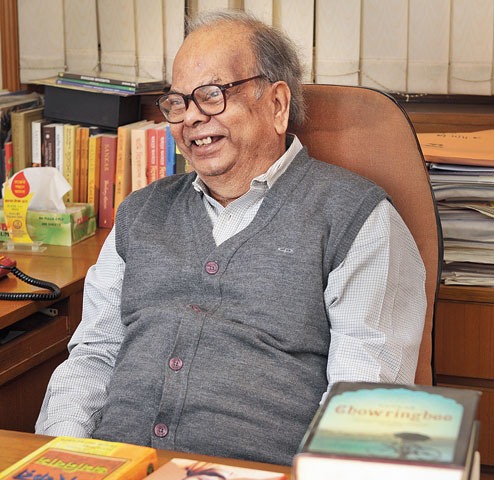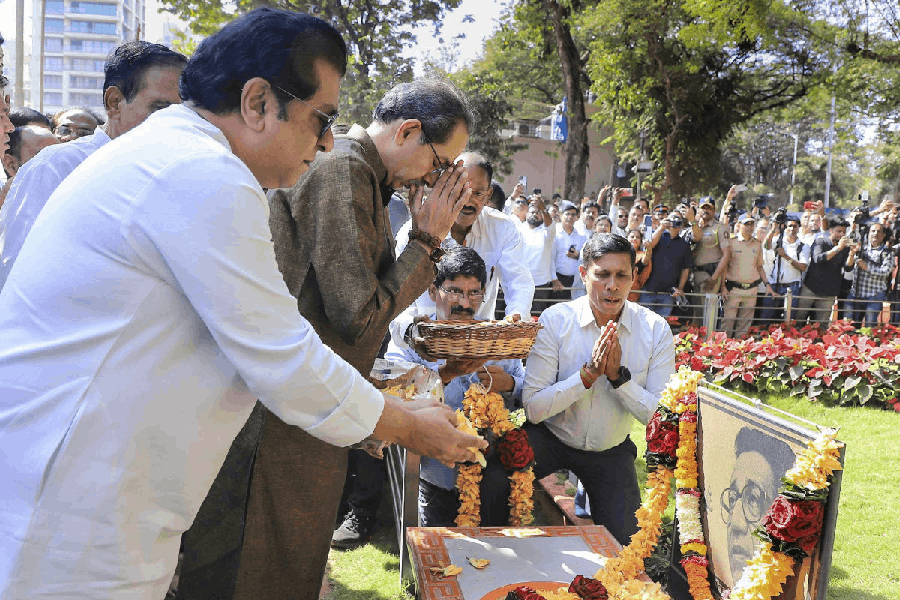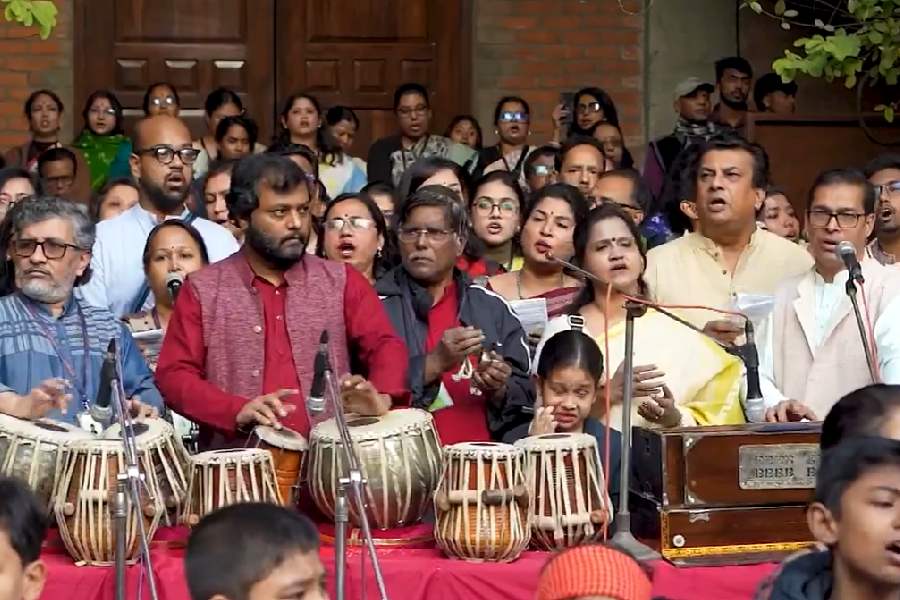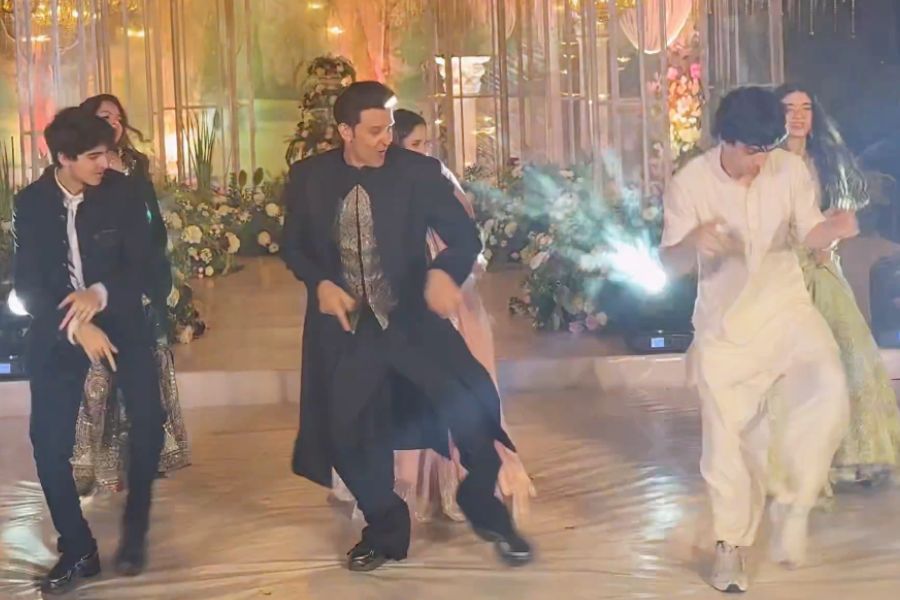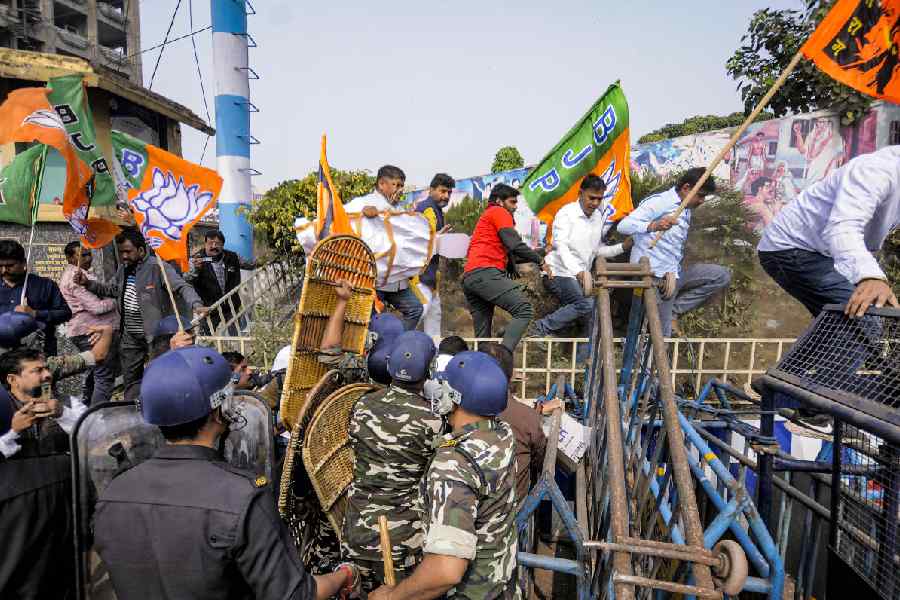
When we enter Sankar’s office near Esplanade, he is sitting at his desk looking rather pleased. Before him is the printout of an email from his daughter Moushumi from the US, about an interview of an Argentine writer by the name of Sergio Chejfec.
“Ki likhechhe dekho (See what they have written)!” he beams as we settle down and sip our tea.
“He was asked if he has read any Indian authors. And he says, ‘Unfortunately I do not know many Indian authors. But a while ago I had the opportunity to read a novel by Sankar, titled Chowringhee. And I was impressed by the combination of history, characters and social geography in this book. I imagine that it must have been one of the best representations of the urban past of one of the most important Indian cities.’”
In its 55th year of publication, Sankar’s most famous novel continues to spread his fame, from Argentina to Agartala.
Life of a monk
But we are here today to talk about another literary feat. Sankar’s non-fiction book, Ochena Ojana Vivekananda, has hit 2 lakh copies. Another Sankar title, Ami Vivekananda Bolchhi, has sold 1 lakh copies. The numbers are quite unprecedented and have taken the writer by surprise too.
“Honestly, I myself don’t know. I wasn’t prepared for this kind of a reception from readers,” he says.
“I would never have dared to write about a revered figure like him in my younger days. But as I got older, I started wondering that while everyone has so much veneration for Vivekananda, how many actually know or care about his struggles and the controversies surrounding him?
“Some 14-15 years back, I confided in my senior from school, Sankari Prasad Basu, who was a Vivekananda scholar, that sometimes I feel like delving into these aspects of Swami and writing about them.
“You know, sanyasis never like to talk about their past, about their pre-sanyasi days. But I kept thinking, if sanyasis were that detached, why did Vivekananda borrow money to help his mother long after embracing his saffron robes? He would go to court to sort out property litigation his family was embroiled in… even the day before he died (1902), he was running around trying to buy some land for his mother. The dichotomy of his duty as a sanyasi and as a son was always there.
“He suffered from pangs of conscience all his life about not providing for his mother or brother or not being there when they needed him most. Do you know, when he died he had incurred a loan on payment of interest from the Belur Math funds, to give his mother?”
The contradiction
“I wrote a piece about this dichotomy in the Puja issue of Patrika, but I was very worried how it would be received. And yes, quite a few sanyasis, especially the younger ones, were mighty upset.
“‘Beshi ostaad hoye gechhe (he thinks too much of himself),’ they said. Then an interesting thing happened. Swami Ranganathananda was then the president of Ramakrishna Mission. He read the piece and said, ‘Arrey, what a good topic this writer has found!’
“He sent word to me that he was very happy that I had dared to work on a fundamental contradiction of sanyasis. When I met him, he said he himself had faced this tussle when he was a young sanyasi and his father had fallen sick.“
‘What I liked most,’ he said, ‘is that you have placed this contradiction in historical context and shown how Sankaracharya faced the same turmoil while leaving his mother. Sri Chaitanya used to visit his home once every year, and Vivekananda had the same contradictions too. So, these conflicting loyalties are natural. And one who cannot love his own mother, how will he love Mother Earth and all her creations?’
“The Maharaj was so kind, he said I should give him my book when it came out. Phew! I heaved a sigh of relief.
“So, I started writing on Vivekananda. Kintu tar porey je ei kando ta hobe bujhte parini (But I had no idea this would happen)! In our scheme of things, one becomes a big gun if 30,000 copies get sold, but as days go by, the numbers for these books just keep rising!” Sankar smiled.
Why does he think these books — despite being non-fiction, which traditionally sell less than fiction — are so popular?
“You know, some people have asked me, ‘Ki moshai, instead of writing stories, you are suddenly interested in writing biographies?’
“But to me, there is no difference between a novel and a biography. One is made up, the other is based on what has happened. These books on Vivekananda have been translated into many languages — Oriya, Assamese, English, Hindi, Marathi, Gujarati. I get calls from all over the world from people who have read these books. I always felt that we needed to know his life story, not just give him our blind adulation. And I have noticed a newfound inquisitiveness about him, which is kindled by these insights into his life and his struggles.”
Mustard oil in pocket
Sankar’s latest book on the monk is on his relationship with food — Ahare-Onahare Vivekananda.
“He loved to eat and he loved to feed people. When he was travelling around America, if one pocket had the Gita, the other had mustard oil! Many of his letters back to India would have requests like, ‘Please send dal.’ Or, ‘Don’t you know bhaja dal does not preserve well, why have you sent this variety? Don’t you dare send this dal again.’ Wherever he went, he would cook for people — pulao, khichuri….
“Vivekananda loved ilish maachh. One time he was going to Dhaka by steamer and the sareng and others onboard demanded a treat. He stopped a fisherman’s boat and asked, ‘How much for ilish?’ The fisherman said, ‘16 fish for one rupee.’ He handed over a rupee. The fisherman was so happy at the bulk purchase, he gave Vivekananda 20 ilish.
“The ilish was procured but now Vivekananda wanted some pui shaak to go with it. He asked the steamer to take him to the riverbank, disembarked and started asking passers-by where he could get pui shaak. One man recognised him. He said, ‘I have some pui shaak growing in my garden, I can give it to you. But I have one condition. You have to give me diksha first.’ Vivekananda agreed to on-the-spot diksha and got his pui shaak,” laughs Sankar.
“These are fun anecdotes but also a yardstick for studying inflation, you know. Re 1 for 20 ilish, each say about 1.5 to 2kg? Now one ilish that size will come for around Rs 2,000. So 20 would come for Rs 40,000. So Re 1 then is about Rs 40,000 now.”
Sankar’s spirit of enquiry is still as robust. His next project is on Vivekananda’s disciple, Sister Nivedita. “I want to write about her struggles. She too died very young, and in terrible penury. I am gathering material from friends at Syracuse University in the US and other places.”

Beating Robi Thakur
So, what are his thoughts on turning 84 on December 7?
“I come from a family where men don’t live long. My grandfather passed away when my father was four or five years old. My father too died young, when I was about 13. So, I was kind of resigned to a short life. But it is also true that it was because of my father’s untimely death and my ensuing struggles to start earning a living that I became a writer.
“There’s another story about my desire to become a writer. Around 1948-49, the USIS library was situated on the second floor of Esplanade Mansion. A special attraction was their cooler, from where you could get a drink of chilled water in a paper cup free of cost. In fact, even the library could be used free of cost. And it was air-conditioned. Someone had suggested to me that it was a good place to go and spend a couple of hours in between job-hunting.
“The first day I went, I had to fill up the visitor’s book before entering. One column said ‘Occupation’. I was in a fix. What should I write? ‘Unemployed’ didn’t sound nice at all. And I had left my studies, so it didn’t feel right to put down ‘student’. Someone said, ‘Just say writer.’ I did that. And it came true, with retrospective effect,” grins Sankar.
“You know, just to live up to that visitor’s book entry, I started writing in newspapers and magazines. When I turned 50, I was quite apprehensive since neither my father nor my grandfather had crossed the 50 mark. I heaved a sigh of relief when I got to 60. I thought, ‘Jaak, hoytoh phanra ketechhe (May be the danger has been averted).’
“Once I turned 70, I thought, well, now at least I can’t be accused of akalmrityu (untimely death). Then came 80. Now, a Bengali writer has many incentives to cross 80. Because, then he can beat Robi Thakur (Rabindranath Tagore died at age 80)! I can’t beat him on any other count, but this one I can! As Shibram Chakraborty used to say, the great advantage of death is that one’s age doesn’t increase after that. So, given that I am 84 now, don’t you think Robi Thakur — who was alive when I was in school, so he was my contemporary in a way — would come take my blessings as my junior now?” he chuckled.
And signalled for us to tuck into a delicious lunch of soup, burgers and gulab jamun.
Happy birthday, Sir.
Samhita Chakraborty
Which is your favourite biography? Tell t2@abp.in

